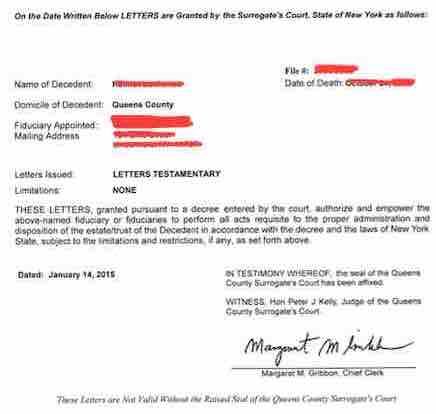Letters Testamentary Sample for New York, NY
Here is a sample of letters testamentary issued by the Surrogate’s Court in New York:

The text of the letters testamentary is as follows:
THESE LETTERS, granted pursuant to a decree entered by the court, authorize and empower the above-named fiduciary or fiduciaries to perform all acts requisite to the proper administration and disposition of the estate of the Decedent in accordance with the decree and the laws of New York State, subject to the limitations and restrictions, if any, as set fort above.
Letters testamentary can only be issued by the court. They cannot be issued by an attorney. You cannot write them yourselves and pretend they are real. That would be punishable as a felony. You can go to jail for doing that, because that would be a forged government document.
If you’ve been named as the executor in someone’s will in New York, you’ll need to obtain letters testamentary from the court before you can start administering the estate. This document gives you the legal authority to act on behalf of the estate. Banks, financial institutions, county recorders, and other third persons holding the decedent’s property will not give you access unless you present to them this document.
At the upper right column, you can see the file number and date of the decedent’s death. The file number indicates the identifying number of the probate petition that was filed. The petition includes the original will, an affidavit of comparison, certified death certificate, waiver of process and consent to probate or citation to heirs, notice to beneficiaries, and other supporting documents.
At the upper left corner, you will see the decedent’s name, his domicile, the fiduciary appointed, and the fiduciary’s mailing address.
The decedent’s domicile decides which county of the New York Surrogate’s Court the petition has to be filed. The decedent’s domicile is the decedent’s primary home address prior to death. If there is more than one residence, the decedent’s domicile is the place where the decedent intended to return. If the decedent died in a nursing home, the decedent’s domicile is the place where the decedent lived prior to entering the nursing home.
The fiduciary appointed is the named executor in the will. The executor is also the petitioner in the probate proceeding. If the executor does not live in the US, it is outside the jurisdiction of New York courts. As such, the executor must name a co-administrator that can be subjected to the New York court’s jurisdiction. Usually, this is the lawyer who files the probate petition. Since the lawyer is not named in the will, the lawyer is considered an administrator c.t.a.
After this section comes Letters Issued and Limitations. Letters Issued can be of administration (when the decedent dies without a will) or testamentary (when the decedent dies with a will). Sometimes, limitations will be defined in the letters. In this sample, there is none. The most common limitation is the restriction of the executor’s authority solely to the filing of a case against a third party for wrongful death and personal injuries.
The body of the letters testamentary grants authority and power to the above-named fiduciary to perform all acts needed for the proper administration and disposition of the estate or trust. These acts include the power to collect the decedent’s assets, pay for the decedent’s debts, and sell the decedent’s real property.
The letters testamentary is then dated and signed by the judge of the Surrogate’s Court. It is accompanied with seal of the Surrogate’s Court. Without such seal, it is invalid.
The letters testamentary are effective upon such date the letters were issued.
The name of the lawyer of the executor is named at the bottom.
The lawyer’s expertise can make the entire process smoother, faster, and less stressful. Should you need legal representation, we at the Law Offices of Albert Goodwin are here for you. We have offices in New York City, Brooklyn, NY and Queens, NY. You can call us at 212-233-1233 or send us an email at [email protected].













